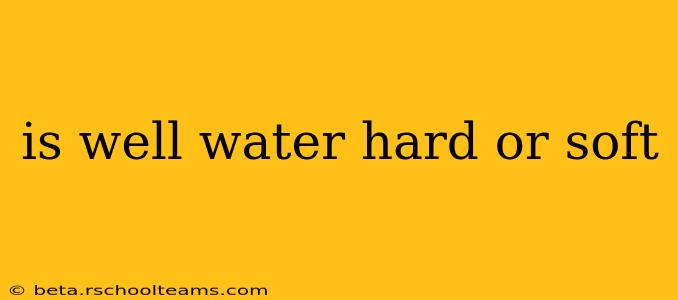Is Well Water Hard or Soft? It Depends!
The hardness of well water is highly variable and depends entirely on the geological composition of the aquifer it's drawn from. Unlike municipal water supplies which often undergo treatment to adjust hardness, well water reflects the mineral content of the surrounding soil and rock. This means that well water can be either hard, soft, or somewhere in between.
To understand this variability, let's delve into the factors influencing well water hardness:
What Makes Water Hard or Soft?
Water hardness is primarily determined by the concentration of dissolved minerals, especially calcium and magnesium ions. Hard water has a high concentration of these minerals, while soft water has a low concentration. These minerals are leached from the soil and rocks as water percolates underground.
What are the geological factors that affect well water hardness?
-
Rock Type: Water flowing through limestone, dolomite, and gypsum formations will typically pick up more calcium and magnesium, resulting in hard water. Conversely, water flowing through sandstone or granite formations is more likely to be softer.
-
Soil Composition: The type of soil surrounding the aquifer also plays a role. Soils rich in calcium and magnesium carbonates will contribute to harder water.
-
Aquifer Depth: Deeper aquifers often have more contact with mineral-rich rock formations, potentially leading to harder water. However, this is not always the case, as the specific geology of the aquifer is crucial.
-
Location: Geographic location significantly impacts water hardness. Some regions are naturally prone to harder water than others due to the underlying geology.
How can I tell if my well water is hard or soft?
There are several ways to determine the hardness of your well water:
-
DIY Hardness Test Kits: Many home improvement stores sell inexpensive test kits that provide a quick and relatively accurate measurement of water hardness.
-
Professional Water Testing: A water testing laboratory can provide a more comprehensive analysis of your well water, including hardness levels and other potential contaminants. This is often the most accurate method.
-
Observing Hard Water Signs: While not definitive, several indicators may suggest hard water:
- Scale buildup: A white, chalky residue on faucets, showerheads, and appliances.
- Soap scum: Difficulty lathering soap and a film left behind on skin and surfaces.
- Water spots: Spots left on dishes and glassware after washing.
- Dry, itchy skin or hair: Hard water can strip natural oils from the skin and hair.
How does hard water affect my plumbing and appliances?
Hard water can cause significant problems over time:
- Scale buildup: Reduces the efficiency of water-heating appliances and plumbing fixtures, potentially leading to premature failure.
- Clogged pipes: Scale buildup can restrict water flow in pipes.
- Increased energy costs: Scale buildup in water heaters forces them to work harder and use more energy.
Is soft water better than hard water?
Both hard and soft water have their pros and cons. Soft water is better for preventing scale buildup and protecting appliances, but it can sometimes have a slightly metallic taste and may be more corrosive to pipes. Hard water isn't inherently harmful, but the scale buildup it causes can be problematic. The optimal level of water hardness often depends on individual preferences and circumstances.
What are the treatment options for hard water?
If you have hard water, several treatment options are available:
- Water softener: This is the most common solution, removing calcium and magnesium ions to soften the water.
- Reverse osmosis: Removes a wider range of impurities, including minerals that cause hardness.
- Water filter pitcher: Offers a less expensive and less effective approach to softening only some water.
Ultimately, whether your well water is hard or soft depends on the specific geological conditions of your location. Testing your water is the best way to determine its hardness and decide on the most suitable treatment options if necessary.
